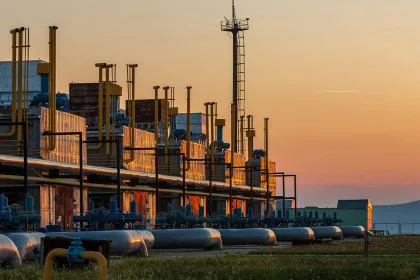Ford is applying global experiences and expertise on a local level in Romania, via a host of market-leading products and corporate social responsibility initiatives.
A SOCIAL FOCUS
The name ‘Ford’ in the world of industry is synonymous with notions of manufacturing excellence, automotive pioneering and product quality. And while these concepts inevitably remain true throughout its Romanian operations, the name ‘Ford’ in this country also brings to mind far more all-encompassing, socially-driven connotations as well.
Set up in the Eastern European nation 11 years ago virtue of an acquisition from an American enterprise – subsequently inheriting the former Automobile Craiova plant – the evolution of Ford Romania ever since has been the perfect amalgamation of traditional Ford product successes, and more community and socially-charged initiatives.
Focusing on the former, the rise of the Company has been unsurprisingly rapid and expansive, kickstarted initially in March, 2008 upon the plant takeover’s completion, and followed up by almost €1.5 billion worth of investments to transform the site into one of the most modern and advanced production facilities across the Group’s global portfolio.
“Vehicle production started in 2009 with the light commercial vehicle (LCV), Transit Connect, and continued in 2012 with the launch of the 1.0l EcoBoost engine, Ford’s multi-awarded engine as International Engine of the Year for four years in a row,” the Company adds. “Also, in 2012, Ford started the production of the multi-activity vehicle, B-MAX, the most innovative product in the segment.”
Due to market trends and the decline of the MPV segment, Ford ceased manufacturing the BMAX in 2017, before replacing it late last year with the launch of the new EcoSport, Ford’s small SUV. Attracting initial investments of almost €200 million, this most recent unveiling not only added a further string to the Company’s already extensive bow, but reaffirmed the business’s flexibility in meeting customer preferences and keeping ahead of the industry curve; an attribute that has been every bit as successful in Romania as it has in existing international markets.
“Ford is one of the top-three selling imported car brands in Romania and has one of the best sales networks with more than 37 showrooms located around the entire country,” the Company continues. “Ford of Romania is one of the most significant employers in the region of Craiova and at the end of the past year, the Company ran the largest recruiting campaign since its inception in Romania, hiring more than 1,700 people.”
All told, Ford employs more than 4,500 people in the country, working closely with a national supplier network of more than 40 Romanian-based companies. Consequently embedding itself into the local fabric of Romania’s manufacturing domain, the Company is perfectly poised to capitalise on a successful first decade of doing business in the country.
RETURNING TO ROMANIA
While a physical impression on Romania can only be traced back to 2007 in the Ford history books, the wider relationship between company and country goes back a lot further.
As far back as 1928 in fact, the 1903-founded Ford Motor Company familiarised itself with the nation via a friendship between Henry Ford himself and the then Secretary of the Romanian Legation in Washington, Andrei Popovici.
“In 1931, Ford opened a sales firm in Romania, and a year later, in 1932, the Romanian Government communicated to the Ford subsidiary in England (which owned the Romanian firm) the availability to open an assembly line in Bucharest,” the Company recalls on its website. “As a result of this invitation, in 1935, Ford acquired land in the Floreasca district of Bucharest, where it built a modern factory, equipped with the first operational line in Eastern Europe, and over 100 workers who could assemble annually 2,500 cars and trucks.”
Resultantly contributing to a significant period of industrial upskilling in the region, a plethora of young Romanian artisans were introduced to the world of high-profile automotive engineering for the first time; a social facilitation that has been loyally repaid over the past decade, but that was initially cut short at the time upon the beginning of the Second World War.
“It was not until 1966 that the Ford Motor Company tried to return to Romania through its German subsidiary, sending a joint venture proposal to the Romanian government,” the Company picks up. “In the meantime, the Ford plant profile in Romania had been changed to automation, where Automatica was operating.
“Ford Motor Company returned to Romania in 2007, this time not in Bucharest, but in Craiova, buying the majority stake in Automobile Craiova and taking over the Automobile Craiova plant in March, 2008. 74 years after the first Ford manufactured in Romania, in September, 2009, the first Ford Transit Connect came out of the Craiova production line, which was donated to the municipal hospital in Craiova.”
WORK, COMMITMENT, DEDICATION
Fast-forward 10 years on and the Company marked its decade anniversary at Craiova on 21 March, 2018, and thus celebrated the share purchase agreement for the Romanian facility that was signed back in 2008.
Originally committing to an initial investment of more than €675 million to transform the Craiova site into a state-of-the-art facility, this number has almost doubled in reality since then, making the site one of Ford’s most advanced on a global scale.
The aforementioned array of products soon began filing their way out of the production facilities and into the hands of an eager customer base. And as demand has evidently grown, so too has Ford’s own infrastructure in the country. The introduction of the new EcoSport in particular led to an additional 1,800 people being employed; highlighting not only the support being received by the Romanian population, but the support that Ford is then giving back in terms of social opportunity.
“It took a lot of work, commitment and dedication from all our Craiova Ford team and I’m personally very happy to witness this great achievement of celebrating 10 years here in Craiova,” said John Oldham, former Ford Craiova Plant Director, in acknowledgement of the achievement. “In these 10 years we’ve not only produced great engines and cars, but we’ve massively increased the number of our employees and we’ve almost doubled at the same time our investment in Romania.”
Current daily production volumes – based on available information within local automotive associations – both in powertrains and vehicles operations have reached almost 1,300 engines and 600 cars, in two shifts, which is a record result in the history of this manufacturing site.
“Craiova is a world-class Ford plant, building world-class vehicles and engines. And most important is that people who work here are world-class too, delivering market-leading technology products at a high-quality level; and I would just like to thank each and every one of them for all their hard work,” Oldham added.
A GREAT TEAM
From 1 April, Oldham was appointed as Transportations Manager Europe, thus vacating his roles as Craiova Plant Director and President of the Ford of Romania Board of Directors.
Now looking after all logistics and transportation-related activities for Ford across the entire continent, the positive exposure directed towards Romania’s rise to prominence is indicative of what he and the Company have achieved over the past 10 years.
“Craiova has been my home for the past four years and I have been very fortunate to have been working here and have such a great team,” Oldham says. “I’m very proud about our work together including the successful launch of the new EcoSport, and I’m fully convinced that our Romanian plant will continue playing a key role in Ford’s manufacturing footprint, delivering at the same time such outstanding products.”
With more than 37 years of experience in various manufacturing roles within Ford of Britain and Ford of Europe, Oldham has been based in Craiova for the past four years, starting in 2014 as Craiova Powertrains Manager; at the time replacing Ian Pearson.
Further managerial tweaks geared towards leveraging the improved and scaled-up structure of Ford Romania have seen Pearson now come back to Craiova as the new site Director and President of the Board of Directors; ironically filling the positions vacated by Oldham.
Pearson had previously been responsible for the production launch of the multi-awarded 1.0 l EcoBoost engine during his time as Craiova Powertrains Manager.
“I’m very excited to be back in Craiova and continue my journey in one of Ford’s most advanced manufacturing facilities,” he notes. “It’s a great privilege for me and I look forward to continue working with our vehicle and powertrain teams offering the best driving experiences to all our customers across Europe.”
In addition to these changes, the Company has also recently announced that from 1 September, Jaime Ortiz-Canavate will be appointed as Manager of Powertrain Manufacturing Engineering for Ford of Europe and previously UK-based, Josephine Payne will fill Ortiz-Canavate’s previous role as Plant Manager for the Craiova engine plant.
“Payne brings a wide breadth of experience to this role from her previous positions in Europe and the US in both powertrains operations and in powertrains manufacturing engineering,” the Company elaborated.
CORPORATE SOCIAL RESPONSIBILITY
Such managerial changes and enhancements may seem like part and parcel of a Company as renowned and vast as Ford, but it alludes to a much more significant achievement in terms of the success that each individual has been able to generate in Romania.
As previously proved, this largely revolves around the products that continue to leave Craiova’s plants but also, as is the case throughout Ford’s global presence, it is down to the Company’s involvement in local community enrichment and via a substantial corporate social responsibility programme.
Working very closely with central and local institutions, CSR has been a key method for Ford to ingratiate itself into the local makeup of Romania, encompassing not just internal employment opportunities and network building, but also external influences on areas of health, education, safety and equality.
“Improving lives of its community members has always been at the core of Ford’s actions in the region of Oltenia and throughout the years, Ford has been investing more than €500,000 in various community activities, focusing on those strategic priorities,” the Company affirms. “All investments made in Romania as part of the corporate social responsibility programmes are made through the Ford Motor Company Fund, the philanthropic arm of the Company, in partnership with various local NGOs.”
Ford Fund was introduced to its Romanian operations in 2014 and was driven initially by the notion of safety and its Ford Driving Skills for Life (DSFL) initiative.
The Company adds: “Observing the great impact of the Ford DSFL programme, Ford decided to go one step further and to shape a dedicated programme for younger people, targeting the right age group who do not possess a driving license (16-18 years old) and started to run a project in Romanian high schools as a way to reduce accident numbers on Romanian roads.
“Other important projects implemented by Ford in the region of Craiova would actually be linked to health. Here, the Company has been actively involved with the support of the local NGOs in sponsoring the Craiova County Hospital with vital medical equipment needed in the neonatology department, but also in paediatric surgery and cardiology.
“Also, teams of volunteers from Ford Romania, together with doctors from Craiova hospitals, have been running for years a row of free community health campaigns such as “Listen to your Heart” which provides free cardiovascular screening campaigns within the poor communities in the Craiova countryside.”
More than 1,500 have benefitted from free cardiology checks so far, demonstrating the influence that Ford can have on a country far beyond the realms of industrial capability.
TOMORROW’S FORD ENGINEERS
Regarding the pillar of education, Ford works closely with authorities at local level, across all grades of schooling and university to enhance the opportunities available to Craiova and Odobleja’s students. Investments in their hundreds of thousands of euros, equipping institutions with the most modern technologies and equipment, aligns itself to Ford’s own vision of modern progression, while also encouraging students to consider manufacturing as a possible career path.
“Ford Fund concentrates around the globe on encouraging young people to take an interest in science, technology, maths and engineering, and the €100,000 investment made in the Mechatronics Laboratory at the Odobleja High School is a perfect example of this,” the Company explains. “Ford Fund is thus focused on helping young people gain the necessary up-to-date skills to ensure a bright future.
“Since 2015, the Company has also supported annual scholarships for students at the Craiova University and also the Odobleja Mechatronics Centre, and is also running internship programmes within the vehicles and engines plant in Craiova, so that today’s students have a real chance of becoming tomorrow’s Ford engineers.”
Bringing Ford’s two areas of concentration back full circle has been an April, 2018 initiative which has seen three EcoSports donated to the Faculty of Mechanics, INCESA Research Institute and to Stefan Odobleja High School in Craiova to be used as teaching materials by pupils.
Included are two Titanium models and a Trend model, vehicles equipped with the multi-award-winning EcoBoost 1.0 litre engine produced in the Craiova factory.
It has already become a tradition for Ford Romania to donate cars and engines to the community in Craiova so that future engineers can gain a better knowledge of new available technologies, of latest generation vehicles, and of engines made by Ford.
The partnership with INCESA and the University of Craiova has already been in place for a number of years, a period in which several important projects for the development of the future specialists of the Romanian automotive industry have been carried out. Furthermore, since 2016, Ford has offered as many as 10 scholarships a year to students of the University of Craiova.
This has since been compounded by the aforementioned investments contributed towards the development of Stefan Odobleja High School.
“The donation made today shows once more Ford’s strong commitment to the community in Craiova, understanding both the opportunities which the future may bring to the young generation of pupils and students in Romania and the current funding challenges within the Romanian education system,” declared Ian Pearson, Plant Manager of Ford Craiova during the announcement.
A BALANCED WORK ENVIRONMENT
Ford’s investment in Romania and for Romania therefore goes beyond vehicle and engine manufacturing and instead encapsulates all that is necessary to become a locally successful enterprise.
And naturally, such values and philosophies are etched within the confines of Ford’s factories as well, as demonstratedby the zero work incidents achieved on site.
Additionally, “in a world of men and robots, women are highly appreciated within Ford of Romania” as further evidence of the Company’s commitment to equality and upliftment in the workplace.
“There are lots of key roles within the Company where women are in charge, not only of the non-production activities such as HR and finance, but also of the production side of the job,” the Company continues. “This all ensures a very balanced work environment for all members of the teams among the plant and the Company will continue encouraging young female students at the University to take technical classes and to apply in engineering, mechatronics or other similar sciences in the future.”
FUTURE SUCCESS
These more personable elements then translate into manufacturing and business success, and Ford Romania’s current production pace is at its highest ever level, reaching as many as 600 vehicles and 1,300 engines each day; virtue of the highly skilled artisans and state-of-the-art equipment that exist within the Company’s facilities.
“One of the main challenges of Ford’s activity in Romania is infrastructure though, and in this regard, Ford is in constant dialogue with the Romanian Government, namely surrounding projects which are important and support not only the present, but also the future success of the plant, given expected increasing volumes,” the Company says. “In order to address this topic further, the Company has also hosted dedicated workshops in Craiova, with the participation of various, relevant Romanian authorities, including the Prime Minister and Minister of Transportation, but also other key investors within the automotive industry in Romania.
“Ford’s plans are to continue addressing this key important topic so as to reach a benefit for other key companies, but mostly for Romanians.”
And this is where the Company’s differentiator, and ambitions lie. Ford is one of the world’s most revered and appealing employers and business operators, yet it applies this international acclaim to a local setting. And just like every other presence point of Ford’s, Romania has benefitted greatly.
Despite only manufacturing in the country for the past 10 years, the legacy goes back almost a century and the foundations have been laid for even more concerted growth in the years to come.
“Ford Motor Company was built on the belief that freedom of movement drives human progress,” the Company concludes. “It’s a belief that has always fuelled our passion to create great cars and trucks. And today, it drives our commitment to become the world’s most trusted mobility company, designing smart vehicles for a smart world that help people move more safely, confidently and freely.”





























